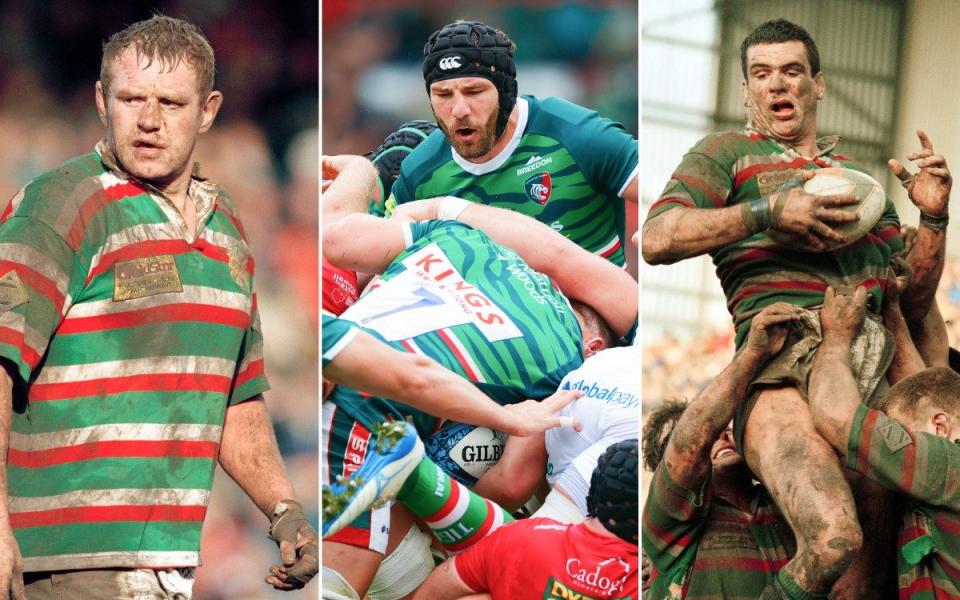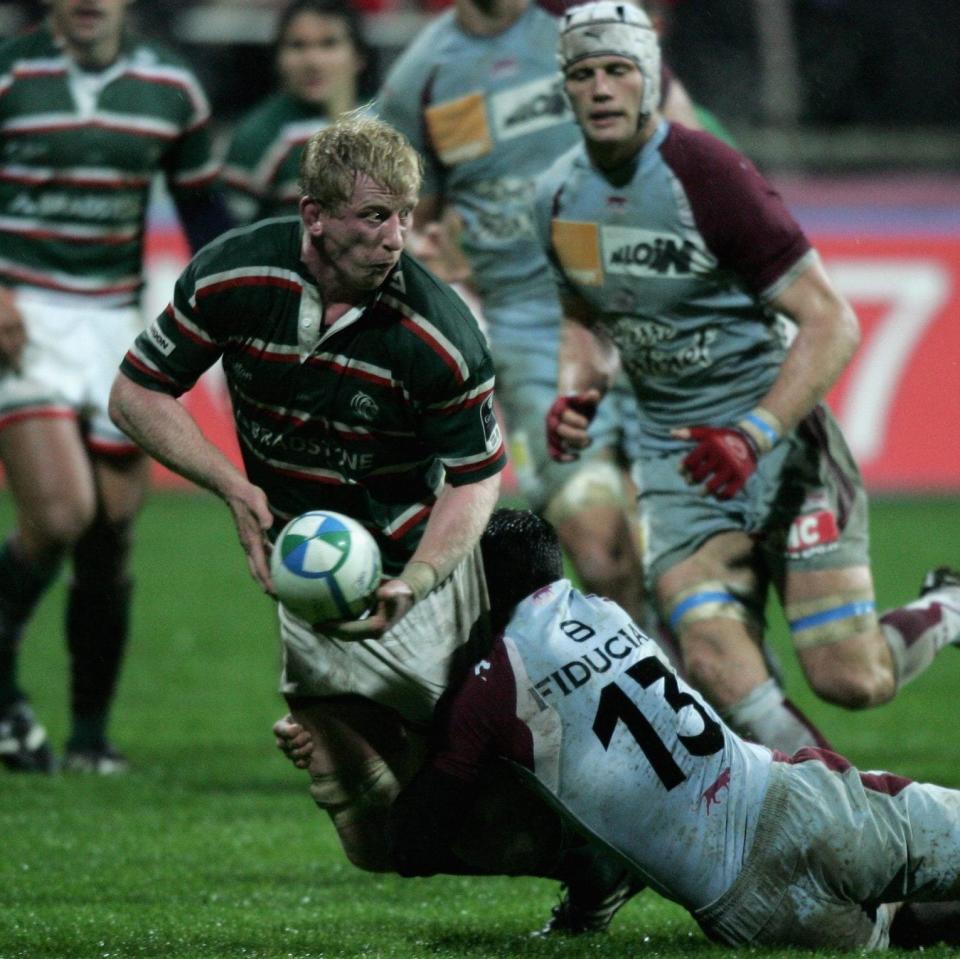How Leicester Tigers developed mauling DNA with help from judo and training scraps

Bottle-kicking is an Easter custom that can be traced back to the late 1700s, pitting the villages of Hallaton and Medbourne against one another in what is essentially a mass maul. Some cite the rough-and-tumble countryside tradition, held near the border between Leicestershire and Northamptonshire, as an ancestor of rugby union.
Leicester Tigers is the closest Premiership club, and one that prides itself on mauling. Sources politely suggest, though, that linking the catch-and-drive to bottle-kicking would be a stretch. Sturdy farmers such as David Matthews, Robin Cowling and Arthur Hazlerigg have been distinguished Leicester forwards. In the late 1970s, Cowling and Hazlerigg drove directly to a derby against Northampton after lambing all night. At the final whistle, they shot off to get back to their animals.
Prior to the early 1980s, however, Tigers were not renowned for huge packs.
Stuart Farmer, the rugby statistician, remembers a gnarlier Gloucester collective outmuscling Leicester in the 1978 John Player Cup final. Bristol and Coventry were historically heftier outfits as well.
‘Australians did not know what to do’
Then, in 1980, having landed the subsequent two John Player Cup trophies, Tigers toured Australia and Fiji. A meeting with Randwick, the Sydney club coached by Bob Dwyer, was billed as the unofficial club world championship. Trailing 13-3 at one stage, Leicester would prevail 31-19.
“Coaches weren’t allowed on the field at half-time in those days,” says Ian Smith, a try-scorer at Coogee Oval. “But Chalkie White got the message on: ‘Maul’. The Australians didn’t know what to do.”
The arrival of Dean Richards was another significant step. Smith describes the burly back-rower, who combined playing with policing, as an all-time great mauler. Two Tigers teams – the crop from 1979 to 1981 and Martin Johnson’s double European champions of 2001-2002– are usually heralded as the club’s best ever. But Smith, now director of rugby at Uppingham School, is always sure to highlight how his 1993 Pilkington Cup winners laid foundations.
They ousted a Northampton side featuring Wayne Shelford in the semi of that tournament before overturning Peter Winterbottom’s Harlequins at Twickenham (watch below). “Our young guns that day were Graham Rowntree, Richard Cockerill, Darren Garforth, Martin Johnson,” adds Smith, by then Tigers coach. “We had enough because the mighty Richards was there holding it all together.”
Blunt force was useful, but tactical intelligence and synergy were critical. “It’s not just about moving forward in a straight line,” says Smith, who remembers Rowntree pumping his legs like pistons. “It’s probing for holes, shifting the point of focus, getting a half-wheel and breaking through before straightening again.”
Neil Back invariably burrowed in and steered his colleagues from the tail, controlling the ball and – often – crossing the white line. “I joke now, but my role wasn’t easy,” says the prolific flanker, who finished with a phenomenal tally of 125 career tries for Tigers. “You have to feel the weight and the movement of eight bodies.
“One year, Ladbrokes came and opened a betting booth at Leicester. I think they’d packed up by Christmas, because everyone – apart from myself – would put a few quid on me being the first try-scorer.”
Mauling measures a team’s togetherness. Dorian West, the ex-Tigers hooker, staged topless mauling sessions when he moved into coaching at Northampton. That stopped players from grasping onto shirts, encouraging them to bind more tightly. Several ex-Tigers are now respected coaches. Thanks to the guidance of Louis Deacon, England Women have become formidable maulers.
‘You had to put a hit on a Tuilagi… or have a fight’
Richards was a master. After rising to the position of Tigers head coach in 1998, he organised judo drills at the police station in Narborough to help his forwards understand the nuances of weight distribution.
“They always finished with ‘King of the Ring’,” recalls Smith, who remained on the backroom staff. “The first week, Dean wore jeans and a polo shirt. A week or so later, he wore his tracksuit. A while later, he joined in. And the only way they could do him was with four players – Lewis Moody, Garforth, Perry Freshwater and another – taking him down.”
Steel hardens steel and Leicester’s mauling culture grew stronger organically. “You had to earn your stripes – pun intended,” explains Jim Hamilton.
“We trained in gear from our junior club, which was Barkers Butts in my case. You earned Tigers training kit by doing something spectacular. As a back, that could be scoring a great try. As a forward, it had to be physical. You had to put a big hit on a Tuilagi brother or someone else… or have a fight.
“One day, it all kicked off during a mauling session between me and [prop] Ricky Nebbett; a bit of grabbing started it and fists were quickly flying. I don’t think I was taking a pasting. But Johnno stopped it. Dean was there and said ‘Right, session over. Jim, go and get your kit.’”
High-profile signings did not receive special treatment. And, anyway, Leo Cullen was aware of what he was leaving Leinster for, having lost to Leicester in two Heineken Cup quarter-finals in 2005 and 2002. Two tries from Back punctuated the latter, a 29-18 win for Tigers on the way to their second consecutive title.

Leicester’s dedication to mauling and the detail implemented by Cockerill, starting out as senior forwards coach after a spell with the academy, struck Cullen. Tuesdays were largely devoted to mauling, and two packs littered with internationals and enthusiastic rookies tore into each other.
“The young guys had to go through the school of hard knocks,” Cullen says. “They’d normally played in the A League on a Monday night and were rolling around again less than 24 hours later.
“We had four international locks – myself, Jim Hamilton, Louis Deacon and Ben Kay. Graham Rowntree was still there in my first year, Marcos Ayerza arrived for my second, Martin Castrogiovanni was there, Julian White.
“The back-rowers, jeepers. Shane Jennings, Lewis Moody, Martin Corry, Henry Tuilagi. Will Skinner went on to Harlequins. Luke Abraham, if you remember him, was as tough as old boots. You had Brett Deacon. It was a serious bloody crew. I will have missed out names as well.”
An enlightened Cullen returned to Leinster in 2007. He laughs recalling the circumstances in which his province won the Heineken Cup two years later, beating Tigers in the final. For one season only, due to an experimental law variation, mauls were allowed to be collapsed. When Leinster and Munster clashed in the semi at Croke Park, Cullen had dragged down a drive. Alan Quinlan took exception, copping a 12-week ban for scraping his hand across the perpetrator’s eyes.
‘Being driven over at home is pretty s---’
Steve Borthwick reinstated the drive as a Leicester staple. In 2021, Montpellier had to resist some monstrous mauls to beat Tigers in the European Challenge Cup final. The following season, which saw Leicester land the Premiership title, a pushover penalty try on the last play edged out Saracens and was greeted with a noise akin to a jet taking off.
It is no coincidence that Harry Wells, the target of that line-out against Saracens three years ago, made more appearances than any other player during Borthwick’s tenure. The battleground of the maul holds a primal appeal.
“It’s a stand-off between two packs; eight-on-eight, a game within a game,” Wells says. “A lot of boys have grown up watching Leicester. It’s something the club is renowned for and fans absolutely love the maul. If you snub a kick at goal and go to the corner, the crowd roars. You feel that buzz.”
Conversely, setbacks sting more because of the expectation. “It doesn’t matter if you’ve won, being driven over at home is pretty s---,” Wells adds. “If you’ve won and you’ve left some chances out there, it feels awful as well.”
Anyone who has visited Welford Road will be acquainted with supporters imploring their team to “heave”. Wells has gradually grown a passion for the craft, honed over years on the fringes. Ed Slater and Brad Thorn were mauling mentors.
It can be easy to overlook the nuances of mauling, such as the movement from dummy jumpers to position themselves for a drive. As Wells puts it, though, “at the end of the day, it’s a mind-set”.
“One of the biggest things is how it’s a contest in the first three seconds,” he continues. “There’s a centre line and the first team to get over it are usually going to have ascendancy.
“In defence, a lot of it is about looking for weakness just as the jumper lands to get them going backwards, because it’s so hard to stop once a team has a rumble on with backs flying in. In attack, it’s staying in the fight as long as possible.”
Defensive turnovers can be “demoralising” for opponents, especially when they are shoving for the try-line. This adds another dimension to a landscape that has shifted over time. Hookers rather than flankers get the tries because the initial latcher cannot slide to the back. Being held up over the whitewash now yields a goal-line drop-out to the opposition rather than a five-metre scrum. You have peels and shift-drives and trendy ‘bounce-out’ moves aplenty.
Wells stresses that specific fitness is crucial, crediting the influence of new conditioner Matt Parr, because a close-range try can cap a sequence of scrums, mauls and pick-and-go carries. You have to pick your moment. “You can’t maul at every line-out. We did that a few years ago and burned ourselves out. You’re not able to run effectively or you’ll get to five metres out and you’re exhausted; your legs are just blown.”
The early signs of the Michael Cheika era, which began at Sandy Park with a second-half exhibition of driving and maul defence to beat Exeter Chiefs, hints that Tigers will hang tough.
For them to upset Northampton Saints this weekend, mauling should play a part. Do that, and Leicester will again claim the bragging rights in the land of bottle-kicking.

